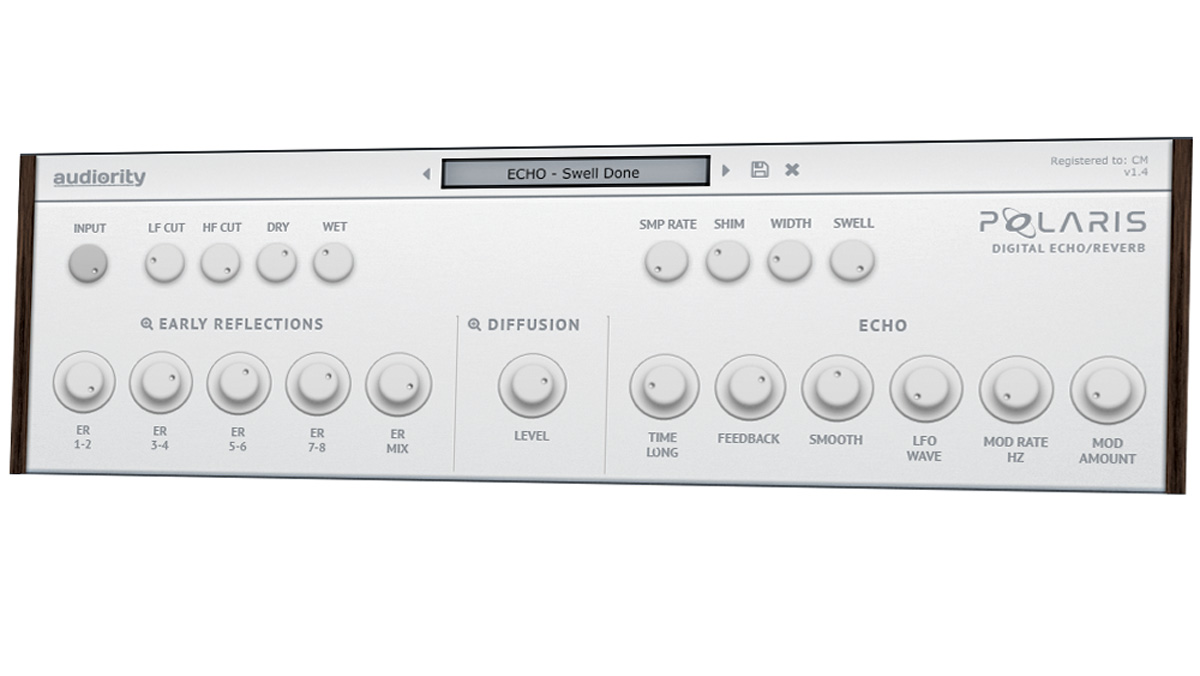MusicRadar Verdict
More of a sound-design and special FX 'verb, Polaris successfully combines retro soul with modern functionality, at a reasonable price.
Pros
- +
Diverse. Easy to use. Does echo effects. Wonderful presets. Unique reverb sound. Does chorus-like effects.
Cons
- -
Not very realistic. Can sound a bit grainy.
MusicRadar's got your back
There are so many amazing and modestly priced reverb plugins on the market today that for a new one to leave a lasting impression, it needs to offer something special or innovative that the others don't.
Audiority reckons its latest 'verb, Polaris (VST/AU/AAX), qualifies.
Inspired by early digital hardware reverbs, Polaris generates its reverberations using a single multi-tap delay line. Ironically, this is more of a throwback to the late 70s than a true innovation, but as a starting point, it enables the plugin to produce a unique array of spatial effects - and we can absolutely assure you it isn't restricted to emulating the sound of early digital reverbs.
Back in the day, a common trick employed at the low end of the digital reverb market was to use unmodulated delays to create an impression of early reflections, then mix in more taps with pitch modulation, approximating the effect of diffusion.
Polaris builds on this by feeding the diffused taps back into a separate Echo section to allow longer reverbs and even full-on delays.
As we've come to expect from any modern reverb, Polaris sports high and low shelving filters at the input stage, although these are at fixed frequencies of 2kHz and 300Hz. While rudimentary, these are very helpful for shaping the sound of the resulting reverb tail.
Next in the signal path is a sample rate reducer, intended to help you achieve the crunchiness of a vintage reverb, although the results are actually much brighter than the classic lo-fi digital effects you might expect.
Want all the hottest music and gear news, reviews, deals, features and more, direct to your inbox? Sign up here.
The main interface has volume controls for each pair of the eight early reflection taps, coupled to be spread evenly between the left and right channels using the Width knob; plus an overall ER Mix knob.
Clicking the magnifying glass icon in the Early Reflections section opens the Early Reflections editor, where you can manually adjust the timing of each ER tap. Yet more control is added with the a Randomise button that scrambles the individual ER times.
The Diffusion section comprises just a volume control, but again, the magnifying glass icon leads to a page in which you can individually adjust the timings of the 16 modulated delays - including the same convenient Randomise and reset buttons.
Then there's Polaris' Shimmer function, which adds a one-octave pitch shift into the delay loop, resulting in… well, 'shimmering' delay sounds reminiscent of the works of Brian Eno, Daniel Lanois and other classic ambient soundscapes.
Finally, the Echo section effectively serves to extend the tail of the diffusion delays, with repetitions in milliseconds, synced beats or notes (C0 to B4). You can even turn down the diffused delays to transform the effect from a washy reverb into an overt delay effect. Further controls let you tweak the speed and depth of pitch modulation.
Poles apart
The sound of Polaris is decidedly artificial, but that's clearly the point, it being based on late 70s technology. While it won't provide a super- classy vocal reverb, and sounds utterly unconvincing on anything with distinct transients, it excels at creative and out-of-this world spatial effects. The included presets do a good job of showing off its wild side, although it's very easy to program.
Polaris is an impressive plugin that probably won't become your main reverb, but will almost certainly complement those that you have already. We'd recommend it to anyone working in creative sound design.
Computer Music magazine is the world’s best selling publication dedicated solely to making great music with your Mac or PC computer. Each issue it brings its lucky readers the best in cutting-edge tutorials, need-to-know, expert software reviews and even all the tools you actually need to make great music today, courtesy of our legendary CM Plugin Suite.

